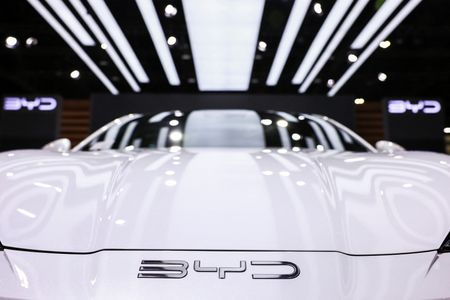BEIJING (Reuters) -Chinese electric vehicle giant BYD reported an 18.6% rise in fourth-quarter profit on Tuesday, its slowest since the first quarter of 2022, as EV sales lost momentum in the world’s biggest auto market amid a brutal price war.
Net profit totalled 8.67 billion yuan ($1.20 billion) last quarter, with revenue up 15.1% at 180.04 billion yuan, according to BYD’s stock market filing.
For the whole of 2023, net profit jumped 80.7% to 30.04 billion yuan, BYD said.
After relentless discounts helped BYD unseat Tesla as the world’s top EV seller in the fourth quarter, the Warren Buffett-backed automaker has taken an even more aggressive stance this year.
BYD on Monday set the starting price of a new version of its Seal electric sedan 5.3% below that of its predecessor, the 16th model it has rolled out this year with a face-lift and a lower price. The deepest discount it has offered this year is 21.6%.
Last year, BYD cut the prices of the 13 models that accounted for 93% of its total China sales by an average of 17%, Reuters calculations showed.
Several other automakers have joined the price war this year, including Tesla, Geely Auto, GAC Aion, Leapmotor and Xpeng, but their discounts pale in comparison with BYD in terms of their depth and the number of models.
However, BYD’s combative discounting is seen eating into its domestic profit margins.
“The latest round of price cuts would inevitably result in a margin hit,” said John Zeng, head of market forecast for China at London-based consultancy GlobalData.
Yet that could be largely offset by BYD’s strong cost control and its growing higher-priced exports, Zeng said, forecasting BYD’s exports at 300,000-400,000 units this year.
BYD exported more than 240,000 cars in 2023, about 8% of its global sales.
Sales of autos and related products that made up 80% of BYD’s operating revenue recorded a 23.02% gross profit margin in 2023, up 2.63 percentage points from a year earlier.
BYD also unveiled the Yuan Up subcompact electric SUV on Tuesday, the latest addition to its Dynasty series with the starting price of 96,800 yuan.
The new model is developed based on its EV architecture e-Platform 3.0, which builds up a frame structure equipped with blade batteries and enables ranges of up to more than 1,000 km (621.37 miles).
China’s EV sales grew 20.8% last year, after a 74.2% rise in 2022, while plug-in hybrid sales growth eased to 82.5% from 160.5%, data from the China Passenger Car Association showed.
China has introduced incentives, such as auto trade-ins and lower down payments on car loans to woo cautious consumers.
($1 = 7.2182 Chinese yuan renminbi)
(Reporting by Qiaoyi Li, Zhang Yan and Brenda Goh; Editing by Himani Sarkar and Tomasz Janowski)












